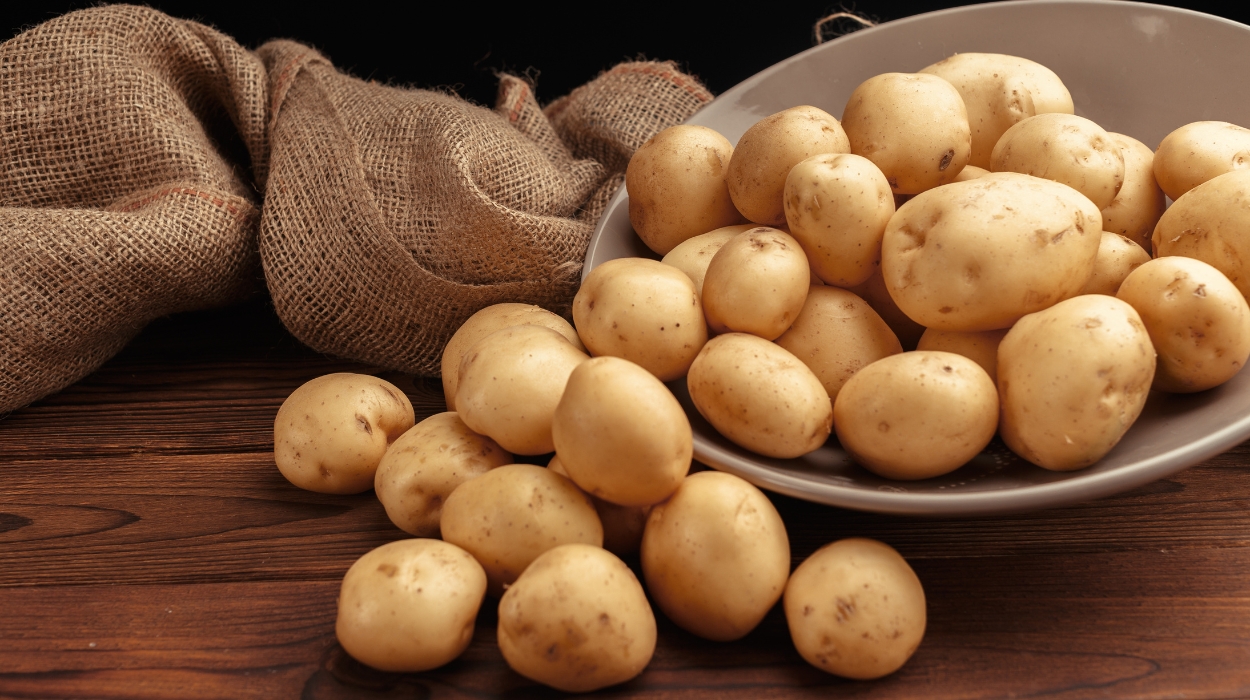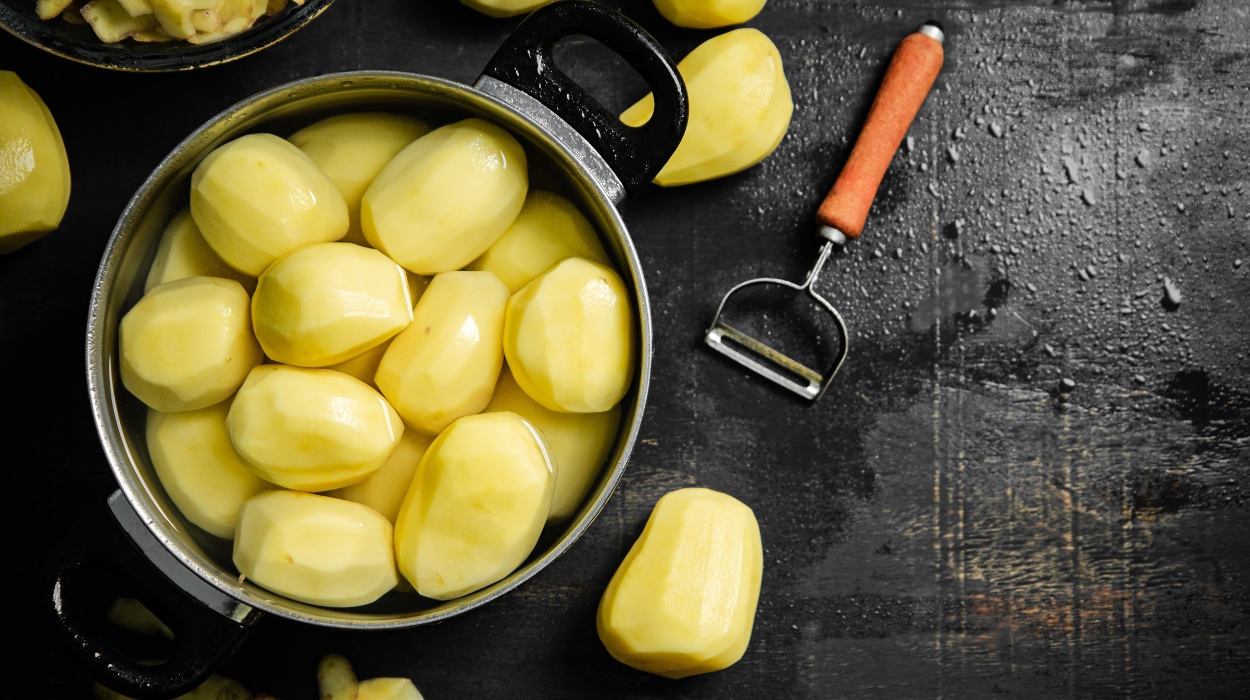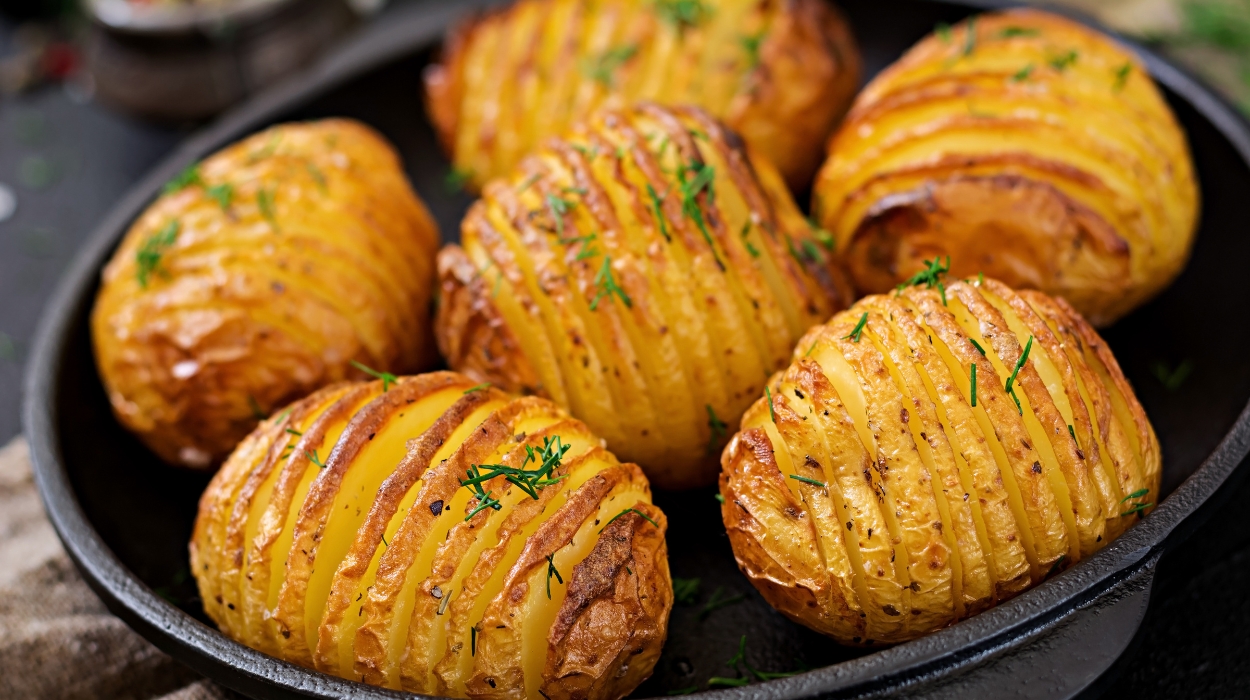 Expert's opinion
Expert's opinion
Expert's opinion
The article is a subjective view on this topic written by writers specializing in medical writing.
It may reflect on a personal journey surrounding struggles with an illness or medical condition, involve product comparisons, diet considerations, or other health-related opinions.
Although the view is entirely that of the writer, it is based on academic experiences and scientific research they have conducted; it is fact-checked by a team of degreed medical experts, and validated by sources attached to the article.
The numbers in parenthesis (1,2,3) will take you to clickable links to related scientific papers.
Are Potatoes A Superfood? Here Are 5 Reasons You May Not Know 2024

Superfoods sometimes come with a certain reputation – they’re exotic or expensive luxury ingredients, found mainly in the pantries of the wealthy, beautiful, and health-conscious.
Look, we’re not opposed to your average bee pollen, maca-cacao, açaí power bowl. All that we’re saying is that even humbler types of food can deliver big-time, nutritionally.
Potatoes are one of the world’s most important staple foods and with good reason. Despite their simplicity, they’re good for much more than french fries.
Is Potato A Superfood?
Potatoes and sweet potatoes boast many superpowers, including the following:
- They’re packed with vitamins, resistant starch, and dietary fiber, all in a form that is absorbed readily by the body.
- Potatoes are the ultimate prebiotic, an ample source of nutrition for all of the good bacteria hard at work in your bowels.
- They might be able to ward off cardiovascular disease, diabetes, and other types of long-term dysfunction.
- The potassium in potatoes can help you lower your blood pressure.
- They’re the perfect low-fat diet food, especially for carb fanatics.
Are Potatoes A Superfood?
Potatoes have been historically vital to the survival of humanity globally – from Europe all the way to the Far East, they’ve provided swathes of starving people with a sustainable source of food that could be stored long-term through winter and famine.
More recently over the last few decades, potatoes have enjoyed some renewed interest and attention as a prominent component of the blue zone movement,[1] a popular study documenting the five parts of the world where people live longer than anywhere else. They’re often attributed above all else to the longevity of native blue zone populations.
Let’s take a closer look at the five key health benefits that make potatoes our favorite superfood.
They Supply An Abundance Of Critical Vitamins And Minerals
Potatoes taste delicious, but their true value lies in their physical and nutritional makeup and composition. White potatoes are far from a nutritionless, empty source of energy in and of themselves. Unlike the mere filler of products made with refined flour, these tubers boast plenty of nutritional power. Even average supermarket potatoes will be a great source of vitamin B6, potassium, and more.
On average, a single, 5-ounce white potato contains:
- 30% of your daily vitamin C
- 15% of your daily potassium
- 10% of your daily vitamin B6
- Some iron and calcium
Not all potatoes are built equally, however. Sweet potatoes, yams, purple potatoes, and other colorful cultivars are good sources of other minerals, as well as more deeply saturated sources of some of the nutrients above.
One medium sweet potato, for example, will provide you with 120% of your recommended daily value of vitamin A and twice as much fiber content as a white potato.
Vitamin A is known for its role,[2] in eye health, but it’s also an imperative compound in immune function,[3] growth in children, the reproductive cycle, and the cell renewal of all surface tissue – the lining of the gut, the respiratory tract, and, of course, our skin cells, as well.
Potatoes Are Prebiotics, Feeding Your Microbiome

Potatoes, especially colorful sweet potatoes, are a good source of resistant starch, one of the best prebiotic treats you can send down the tube. What does this term mean, exactly, and how does it relate to soluble fiber and insoluble fiber?
We all know what good gut bacteria are[4]; these are the microscopic gut flora that aid in digestion once your food has made it to your intestinal system. Probiotics describe different sources of friendly gut bacteria, like kefir, kimchi, kombucha, and other fermented foods.
Once these bacteria have landed in your bowels, they’ll need food to eat in order to survive. Prebiotics describe any source of food that helps them flourish. Bananas, apples, and potatoes are all excellent sources of prebiotic-resistant starch.[5]
Resistant starch shines because it straddles the line between soluble and insoluble fiber. It boasts some properties of the latter, passing through your system undisturbed[6] and cleaning your insides out. Once it reaches your intestines, it isn’t absorbed immediately, unlike other soluble nutrients. It does, however, undergo an important change that insoluble fiber does not.
Resistant starch is hearty enough to survive the trip, but it ferments as it moves along. This fermentation breaks the starch down so that the colonocytes in your gut can break them down and consume them, providing them with the energy they need to survive and serve their role in digestive health.
Potatoes Combat Disease And Dysfunction In The Body
Antioxidant foods are vital to the prevention[7] of cardiovascular disease, neurodegenerative disorders, the effects of aging, rheumatoid arthritis, cancer, and some types of autoimmune diseases. They do so by sweeping up natural toxins in the body and by counteracting oxidative stress.
Young potatoes in particular[8] have been found to be a significant source of antioxidant compounds. This study found that exposure to potato extracts from new potatoes actually inhibited the growth of human cancer cells through antioxidant activity directly. This regulating effect has been suggested to help the body protect itself long-term.
They Might Even Help Lower Blood Pressure
As mentioned previously, every type of potato will be a generous source of compounds like potassium. This vasoactive nutrient[9] might actually be able to help you regulate your blood pressure and maintain the health of the red blood cells in your bloodstream.
The same free radicals that prevent heart disease and more also play a key role in the health of your entire cardiovascular system. Your veins are clearer and your heart isn’t struggling to push every pump through.
Potatoes Can Help You Lose Weight

Potato protein is a good source of highly satiating energy, naturally low in fat and complex enough to sustain brain function throughout the day. Part of the reason we feel so full and satisfied after eating a potato: is its low glycemic index.
There’s plenty of clinical evidence backing a low-glycemic index diet, or low-GI diet, as being superior to a calorie-restrictive diet alone for weight loss. Trial participants lose just as much weight without the fatigue and brain fog associated with a restrictive diet.[10]
Any type of potato will fuel your body without spiking your blood sugar. Essentially, this means that the body’s post-prandial glycemic response[11] after eating a potato is much less dramatic than when eating refined carbohydrates, such as white bread and other simple sources of empty calories.
In plainer terms, it takes more time for your body to break a potato down and get to the starches that it’s able to absorb as food than it would for something that has already been milled, processed, or refined, like granulated sugar. What does this mean for you?
Low-GI foods elicit a significantly more manageable hunger response, and they do so after much more time than the processed, high-GI examples mentioned just above. High-GI foods leave us hungrier sooner, and weight gain results naturally as we overindulge after the fact. Eating potatoes pushes other more fattening food options off of our plates.
How To Work More Potatoes Into Your Superfood Diet?
Potatoes are a naturally delicious ingredient to incorporate into your routine. Depending on the kind that you prefer, you can eat potatoes any way that you want.
- Any type of potato makes an excellent side to go alongside an ordinary meal. You can roast a tray of seasoned potato wedges or make mashed potatoes healthy for a classic dinner plate: red meat, some sort of greenery, and your favorite potato recipe.
- You can also mash steamed or boiled sweet potatoes and add the puree to your favorite baked goods – a Greek yogurt and sweet potato snack cake, or perhaps sweet potato muffins with dark chocolate chips.
- Leftover cooked potatoes are perfect for hash brown patties, potato pancakes, and croquettes if you’re feeling ambitious. Simply add a bit of flour, your preferred seasoning, and toss them into your skillet with a bit of olive oil.
- Potato skins are another fun snack for those watching their blood sugar levels, and they’re really easy to prepare ahead of time. You can stuff them with anything you want or keep things quick and low-maintenance – a sprinkle of sea salt, a drizzle of olive oil, and then into a 375F oven until crispy.
All of these recipes are guaranteed to hit the spot, especially when you need fuel on a moment’s notice. Fast food, done right. On with the day.
The World’s Favorite Superfood Should Be Yours, Too
How do you define a superfood? It doesn’t have to be something that you’ll only find online or at Whole Foods. These starchy little powerhouses are readily available everywhere and contain everything your body needs to see the day through.
The evidence is compelling; the satisfaction speaks for itself. As far as we’re concerned, potatoes are one of the best superfoods on the block.
+ 11 sources
Health Canal avoids using tertiary references. We have strict sourcing guidelines and rely on peer-reviewed studies, academic researches from medical associations and institutions. To ensure the accuracy of articles in Health Canal, you can read more about the editorial process here
- Buettner, D. (2016). Blue Zones: Lessons From the World’s Longest Lived – Dan Buettner, Sam Skemp, 2016. [online] American Journal of Lifestyle Medicine. Available at: https://journals.sagepub.com/doi/abs/10.1177/1559827616637066.
- Gilbert, C. (2013). What is vitamin A and why do we need it? Community eye health, [online] 26(84), p.65. Available at: https://www.ncbi.nlm.nih.gov/pmc/articles/PMC3936685/.
- Annual Reviews. (2017). VITAMIN A, INFECTION, AND IMMUNE FUNCTION*. [online] Available at: https://www.annualreviews.org/doi/abs/10.1146/annurev.nutr.21.1.167.
- Eamonn Martin Quigley (2019). Prebiotics and Probiotics in Digestive Health. Clinical Gastroenterology and Hepatology, [online] 17(2), pp.333–344. doi:https://doi.org/10.1016/j.cgh.2018.09.028.
- Zheng, Y., Wang, Q., Li, B., Lin, L., Tundis, R., Loizzo, M.R. and Xiao, J. (2016). Characterization and Prebiotic Effect of the Resistant Starch from Purple Sweet Potato. Molecules, [online] 21(7), pp.932–932. doi:https://doi.org/10.3390/molecules21070932.
- Evangélica Fuentes-Zaragoza, Sánchez-Zapata, E., Sendra, E., Sayas, E., Navarro, C., Fernández-López, J. and Pérez-Alvarez, J.A. (2011). Resistant starch as prebiotic: A review. Starch – Stärke, [online] 63(7), pp.406–415. doi:https://doi.org/10.1002/star.201000099.
- Pham-Huy, L.A., He, H. and Pham-Huy, C. (2008). Free radicals, antioxidants in disease and health. International journal of biomedical science : IJBS, [online] 4(2), pp.89–96. Available at: https://www.ncbi.nlm.nih.gov/pmc/articles/PMC3614697/.
- ACS Publications. (2014). Antioxidant Compounds and Antioxidant Activity in ‘Early Potatoes’. [online] Available at: https://pubs.acs.org/doi/abs/10.1021/jf073322w.
- American Journal of Physiology-Regulatory, Integrative and Comparative Physiology. (2020). Role of potassium in regulating blood flow and blood pressure | American Journal of Physiology-Regulatory, Integrative and Comparative Physiology. [online] Available at: https://journals.physiology.org/doi/full/10.1152/ajpregu.00491.2005.
- Davies, R. (2016). Weight loss and improvements in fatigue in systemic lupus erythematosus: a controlled trial of a low glycaemic index diet versus a calorie restricted diet in patients treated with corticosteroids – RJ Davies, MCE Lomer, SI Yeo, K Avloniti, SR Sangle, DP D’Cruz, 2012. [online] Lupus. Available at: https://journals.sagepub.com/doi/abs/10.1177/0961203312436854.
- Esfahani, A., Julia M.W. Wong, Arash Mirrahimi, Villa, C.R. and Cyril W.C. Kendall (2011). The application of the glycemic index and glycemic load in weight loss: A review of the clinical evidence. IUBMB Life, [online] 63(1), pp.7–13. doi:https://doi.org/10.1002/iub.418.



